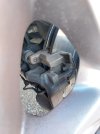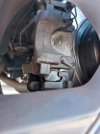It's likely the 'greasing' is not helping - grooved / slotted / drilled discs are mainly for looks and have no engineering benefit, at least the aftermarket variants...
If it occurs once the brakes are warm, then check the pad backing isn't delaminating, pad slides for free movement - and NO copperslip on the slides or brake pads. Slide pins should have low viscosity silicon grease lightly applied, brake pads should have Nickel grease only on the front pads and then only on the ends of the metal backing as a friction reducer where they contact the caliper unless your rear pads don't have the hard metal shims (make sure the plastic backing is intact and on the top of the carrier) the rear pads should not be greased and the carrier should be cleaned and rust gently filed away so that the pad backings have free movement in the carrier - but not enough to chatter! It may be worth chamfering the trailing edge of the brake pads so there isn't a hard edge being presented on reversing.
Difficult to be 100% but the brake discs look like they've got a lip on them with a 'blueing' where the pad has been dragging, causing a hotspot - there's also a lot of grease on the pad backing, negating all the development work done by the brake manufacturer to develop a backing that transfers heat and prevents brake noise, I seem to remember that those pads have an adhesive backing to help withdraw them from the disc, greasing them negates that function. The discs also appear to be aftermarket, so won't be the same quality of casting - which in part will explain the scoring, that, and the amount of brass added to the brake pads.
Personally, I've always fitted genuine brakes on my vehicles - never had a problem with brake noise other than when they ingest a foreign object and squeal like a stuck pig....


